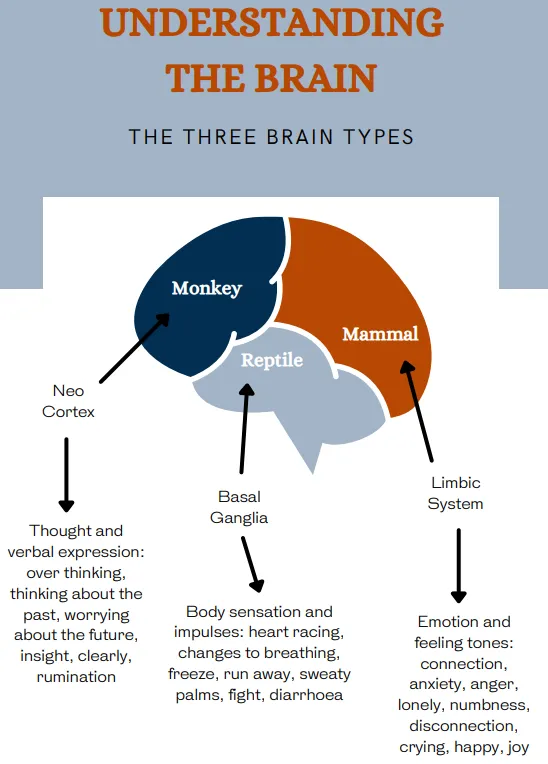Understanding your brain when you are stressed

The Brain
The largest part of the brain is called the neocortex. This is the thinking, problem-solving, and decision-making part of our brain. It's what sets us apart from other animals and is responsible for our advanced cognitive abilities. It's like the icing on the cake, so to speak.
Now, let's take a moment to appreciate how amazing this journey of brain development is. When we're born, we have the basic survival functions in place, but our brains are far from fully developed. The majority of our brain's growth and development happens in the first three years of life. It's during this time that the connections in our brain are rapidly forming, like a house getting wired for electricity.
Think of it this way: a newborn baby has the wiring for survival, but not much else. As they grow and experience the world around them, those connections start to build. They begin to recognize faces, feel emotions, and even start to learn language. This process is like a construction project in your brain, with new circuits being built and refined every day.
But here's the fascinating part: the brain's development is influenced not just by our genes, but also by our environment and experiences. Just like a house can be remodelled and renovated, our brains can adapt and change based on what we go through in life. This is called neuroplasticity, and it's one of the most remarkable aspects of our brain.
For example, if a child grows up in a loving and nurturing environment, their limbic system, that emotional and social part of the brain, will develop in a healthy and balanced way. They'll learn to form positive relationships, manage their emotions, and navigate social situations effectively. On the other hand, if a child experiences trauma or neglect, their limbic system may develop differently, leading to emotional challenges later in life.
So, when we talk about understanding the brain, it's not just about knowing its structure and functions. It's also about recognizing the profound impact our early experiences have on shaping who we are as individuals. Our brains are incredibly adaptable, but they can also be vulnerable to the effects of adversity.

Stress
Now, let's dive a bit deeper into how our brain responds to stress. Remember, our brain's primary concern is protection and safety. So, when it perceives a threat or danger, it triggers the stress response to keep us safe. Imagine a stressful situation unfolds. Maybe you're faced with a sudden deadline at work, or you have a disagreement with a loved one. In that moment, your brain goes into action. The lower parts of your brain, the brainstem, and the limbic system, take charge. They hijack the thinking part of your brain, the prefrontal cortex (this is the most important part of the neocortex).
This hijacking is what makes you feel like you're "losing your cool" or "flipping your lid" during stressful moments. It's a survival mechanism designed to help you react quickly. When you're in this state, your thinking becomes impaired, and you may act impulsively or say things you later regret.
This is why it's so crucial to understand how your brain responds to stress. When you can recognize that your brain is in "protection mode," it gives you the power to pause and choose how to respond, rather than react instinctively. It's that space between reacting and responding that can make all the difference in your well-being and relationships.
What can I do?
So, what can you do to manage stress and harness the power of your brain? It starts with self-awareness. Recognize the signs of stress in your body and mind. Pay attention to your thoughts, emotions, and physical sensations. This awareness is like flipping on a light switch in that old house with the messy wiring. It helps you regain control.
Once you're aware of your stress response, you can practice techniques to calm your brain and bring it back to a state of integration. Deep breathing exercises, mindfulness meditation, and physical activity are just a few strategies that can help regulate your brain's response to stress.
Understanding your brain, its development, and how it responds to stress empowers you to take charge of your well-being. It's not about memorizing complex terms or diving into neuroanatomy. It's about having a simple, yet powerful framework.
And as you continue to explore the incredible world of brain function, you'll find that the more you understand, the more you can apply this knowledge to enhance your well-being, build stronger relationships, and make better choices in life. Your brain is your greatest asset, and with a little understanding, you can unlock its full potential.
So, here's to your brain – the remarkable, adaptable, and ever-evolving organ that guides you through life's journey. Embrace the power of understanding and watch how it transforms your world.
I hope this blog has given you an insight into how the brain works, especially when exposed to stress. As I always say, this journey is not a sprint. Take your time, practice pausing and listening to what your brain, and body are telling you. Practice is the key. If you would like to learn more about me and how I may best support, can look me up here.


0 comments
Leave a comment
Please log in or register to post a comment